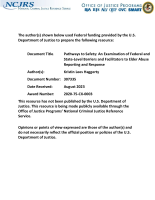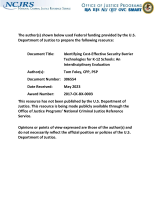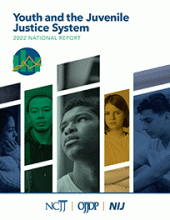Policy makers
Evaluating Processes and Outcomes of Housing Models for Victims of Human Trafficking
Domestic Terrorism Targeting America’s Political Elites
Networks and Pathways of Violent Extremism: Effectiveness of Dis/Misinformation Campaigns
Pathways to Safety: An Examination of Federal and State-Level Barriers and Facilitators to Elder Abuse Reporting and Response
Identifying Cost-Effective Security Barrier Technologies for K-12 Schools: An Interdisciplinary Evaluation
Youth and the Juvenile Justice System: 2022 National Report
Human Trafficking Project
Pistol Packing Teachers: What Do Students Think?
When They Can't Talk Lives Are Lost: What Public Officials Need to Know About Interoperability
Reducing Institutional Disorder: Using the Inmate Risk Assessment for Segregation Placement to Triage Treatment Services at the Front End of Prison Sentences
Desistance From Crime: Implications for Research, Policy, and Practice
Most scholars would agree that desistance from crime – the process of ceasing engagement in criminal activities – is normative. However, there is variability in the literature regarding the definition and measurement of desistance, the signals of desistance, the age at which desistance begins, and the underlying mechanisms that lead to desistance. Even with considerable advances in the theoretical understanding of desistance from crime, there remain critical gaps between research and the application of that research to practice.
See the YouTube Terms of Service and Google Privacy Policy
Phase Two of ETA: Evaluation of Technology-based Advocacy Services: Assessment of Program Outcomes
NIJ-Funded Research on Mass Shootings to Advance Evidence-based Policy and Practice
School Safety: A Focus on Teachers and Administrators - Breakout Session, NIJ Virtual Conference on School Safety
On February 16-18, 2021, the National Institute of Justice hosted the Virtual Conference on School Safety: Bridging Research to Practice to Safeguard Our Schools. This video includes the following presentations:
See the YouTube Terms of Service and Google Privacy Policy
Notes From the Field: Providing Reliable Interoperability for First Responders
Advancing Understanding, and Informing Prevention of Public Mass Shootings: Findings from NIJ Funded Studies, Part 2
In recent years, NIJ invested in several research projects to advance understanding and inform prevention of public mass shootings.
See the YouTube Terms of Service and Google Privacy Policy
Advancing Understanding, and Informing Prevention of Public Mass Shootings: Findings from NIJ Funded Studies, Part 1
In recent years, NIJ invested in several research projects to advance understanding and inform prevention of public mass shootings.
See the YouTube Terms of Service and Google Privacy Policy





